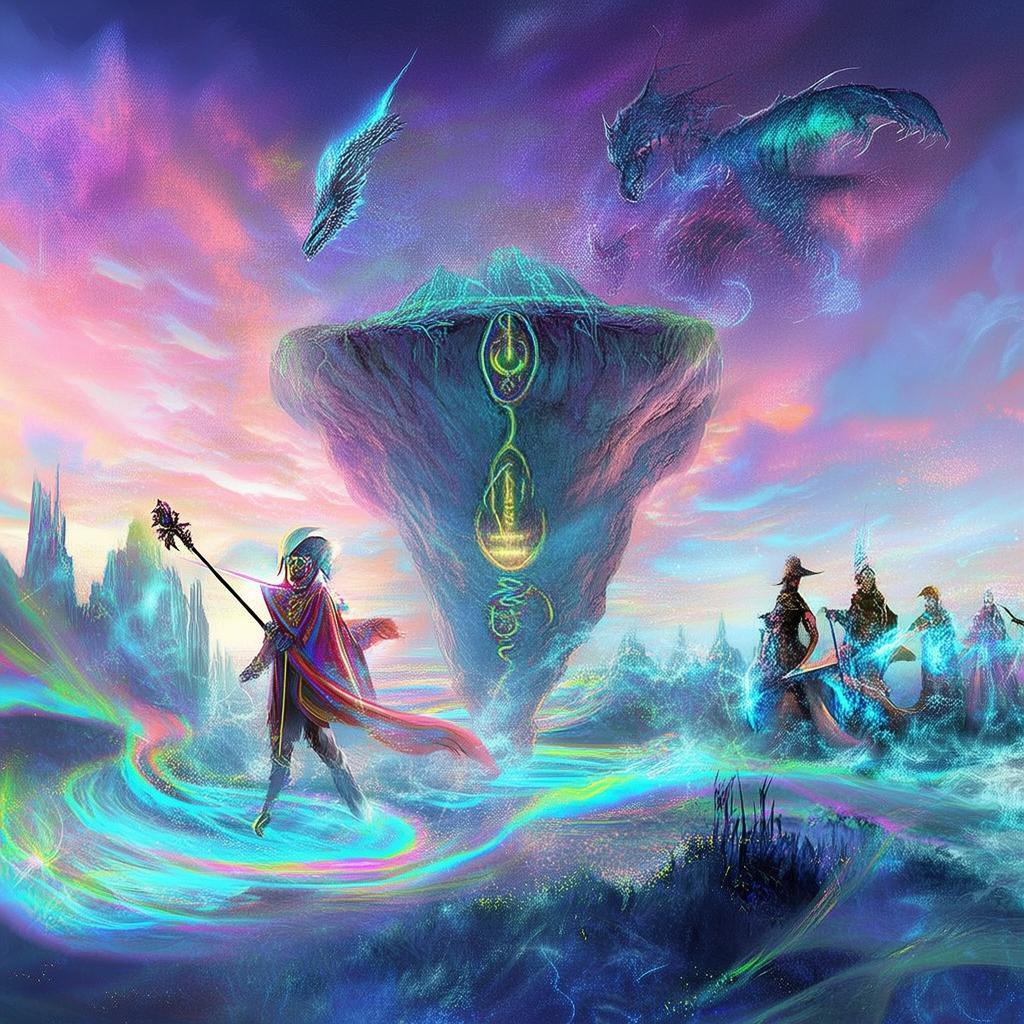The Labyrinth of the Lost Soul
In the heart of the forgotten realms, where the boundaries between the living and the dead blurred, there lay a labyrinth known as the Labyrinth of the Lost Soul. It was a place of ancient magic and forgotten secrets, a place where the spirits of the departed wandered, lost and tormented by their own past misdeeds.
Amara, a young sorceress with a heart as vast as the cosmos, had wandered into this realm by accident. Her quest was simple: to find her lost brother, who had vanished without a trace years ago. But as she delved deeper into the labyrinth, she discovered that her brother's disappearance was no mere accident. It was a riddle wrapped in a mystery, and the labyrinth itself was the key.
The labyrinth was a maze of twisted corridors, each lined with the echoes of the past. The walls whispered tales of love and loss, of triumph and despair. Amara felt the weight of these stories pressing upon her, a reminder of the human condition—a condition she had long since forgotten in her quest for power.
As she ventured forward, Amara encountered the first challenge: a guardian of the labyrinth, a specter of a sorcerer who had once sought to master the labyrinth's secrets. The sorcerer, now bound to the walls, revealed that the labyrinth was a living entity, a sentient being that could only be mastered by one who could accept their own past and learn from it.
"I am the labyrinth," the specter's voice echoed in Amara's mind. "You must face your fears and confront your past to find your brother."
Determined, Amara pressed on, her resolve unbreakable. She encountered more guardians, each representing a different aspect of her own life. There was the guardian of her childhood, who reminded her of the innocence she had lost. There was the guardian of her heartbreak, who taught her the pain of love and loss. And there was the guardian of her ambition, who showed her the folly of power.
Each guardian posed a riddle, a test of Amara's resolve and understanding. She solved them with ease, her mind sharp and her will unyielding. But as she progressed, she realized that the labyrinth was not just a test of her intelligence; it was a test of her soul.

One guardian, a specter of a betrayer, appeared before her. This was the man who had stolen her brother from her, leaving her to mourn his loss for years. Amara's heart raced with anger and sorrow. She was ready to destroy the specter, to make him pay for his treachery.
But the labyrinth's voice spoke again, its tone filled with a wisdom that Amara had never known. "You must understand, child. Your brother's loss is a part of you. To destroy him is to destroy a part of yourself."
Amara's eyes widened. She realized that her brother's disappearance was not just a personal tragedy; it was a reflection of her own failures and fears. With a heavy heart, she forgave the betrayer, and the specter vanished, leaving behind a sense of peace.
The labyrinth's final guardian was the most daunting of all. It was a specter of her own soul, a manifestation of her deepest fears and regrets. The guardian spoke to her of her past, of the choices she had made and the consequences that followed.
"You must face your soul," the guardian said. "Only then can you find your brother."
Amara stood before the guardian, her heart pounding. She closed her eyes and allowed the guardian to show her her past, her present, and her future. She saw the mistakes she had made, the pain she had caused, and the love she had lost.
Then, the guardian revealed the truth: her brother had not been stolen. He had chosen to leave her, to seek his own path, to find his own redemption. The labyrinth had been his guide, and he had been using it to learn and grow.
With this revelation, Amara's heart swelled with a newfound understanding. She realized that her brother's journey was her own, and that the labyrinth was a metaphor for the human soul—filled with pain, confusion, and the promise of redemption.
As the guardian faded away, Amara felt a sense of clarity. She knew that her quest was not to find her brother, but to find herself. She knew that the labyrinth was not a trap, but a guide, a teacher.
With a newfound sense of purpose, Amara stepped out of the labyrinth, her soul lighter and her heart full of hope. She had faced her fears, confronted her past, and learned to forgive. She had found her brother, not as a lost soul, but as a part of herself.
And as she walked away from the labyrinth, the forgotten realms seemed to fade into the background. Amara knew that her journey was just beginning, and that the labyrinth's lessons would guide her through the rest of her life.
In the end, the Labyrinth of the Lost Soul was not a place of despair, but a place of hope. It was a place where lost souls could find themselves, where the past could be confronted, and where redemption was always possible.
✨ Original Statement ✨
All articles published on this website (including but not limited to text, images, videos, and other content) are original or authorized for reposting and are protected by relevant laws. Without the explicit written permission of this website, no individual or organization may copy, modify, repost, or use the content for commercial purposes.
If you need to quote or cooperate, please contact this site for authorization. We reserve the right to pursue legal responsibility for any unauthorized use.
Hereby declared.









